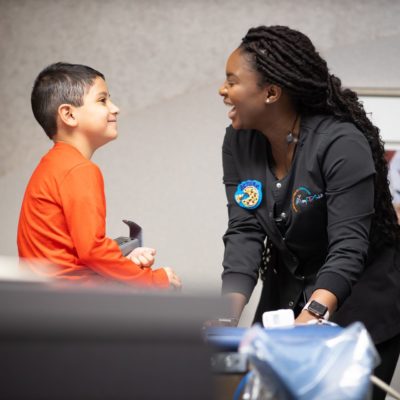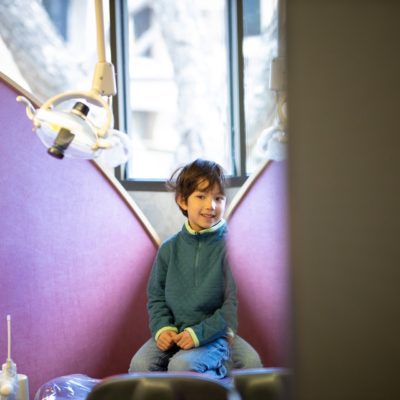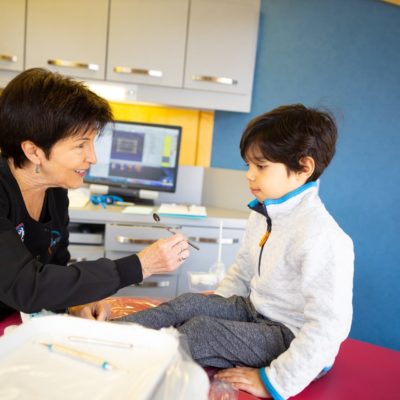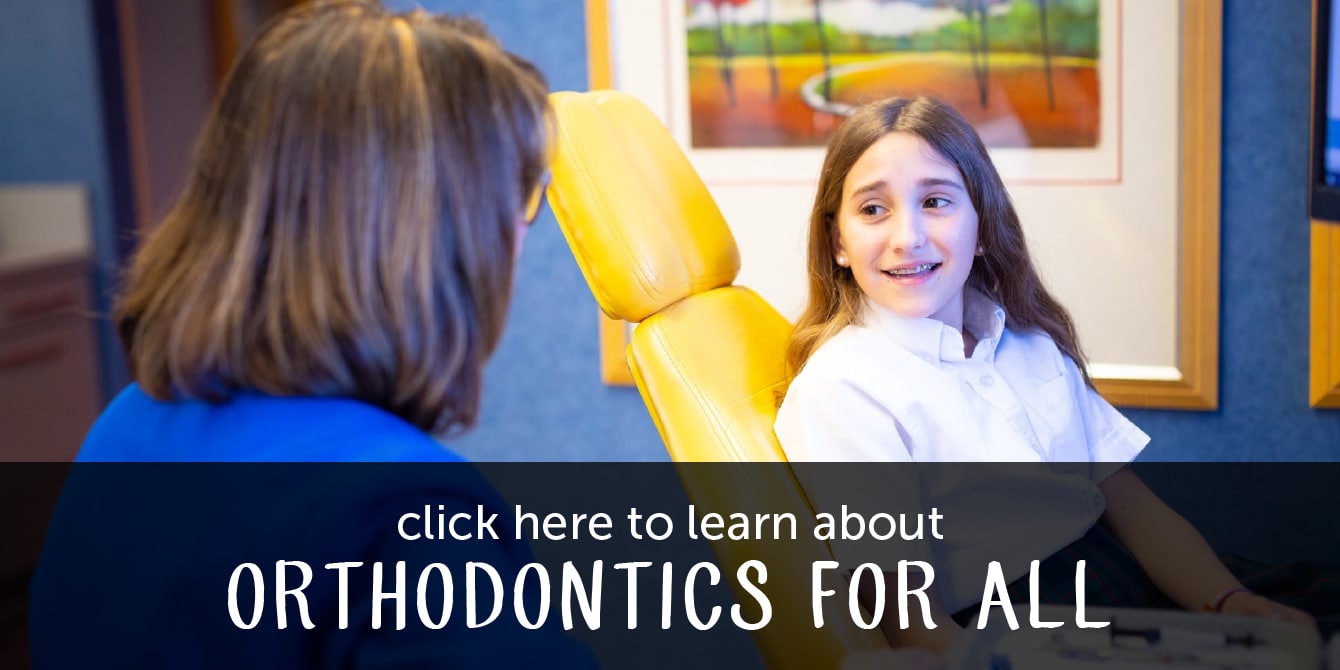At myKIDSdds, you can ask us absolutely anything! You can also find some of the most common questions about how to care for your children’s teeth — with answers straight from our doctors. Looking for more information? Check out our Dental Milestones guide!
Office Visits:
When should I schedule my baby’s first visit?
The American Academy of Pediatric Dentistry recommends that your baby’s first dentist appointment be within six months of their first tooth. This will usually take place around their first birthday. Tooth decay can happen early so the earlier you get your little one in for a visit, the better! While you’re here we will also look for any other issues and early problems your baby might have such has frenum attachments that might prevent your baby from eating properly.
What is the difference between a pediatric dentist and a general dentist?
All dental specialists (pediatric dentists, orthodontists, oral surgeons, and others)begin by completing dental school, then continue their education with many years of training in a specialized field. While training in the field of pediatric dentistry, pediatric dentists gain extensive knowledge and experience in treating infants, children, and adolescents.
What will our first dental visit be like?
We have designed our office for young visitors. Everything from our staff, office design, decorations, and activities are all made to work harmoniously to provide a friendly and comfortable environment for children. The process for your child’s first visit is simple and will typically consist of a comprehensive exam, x-rays if needed, and a cleaning. During the exam, the doctor will check your child’s teeth for any potential problems with the teeth, gums, and jaw. We will answer any questions you might have about your child’s oral development and provide you with materials and helpful tips and tricks to help you keep your child’s teeth healthy at home.
How often should my child come in?
For children to maintain healthy dental hygiene, it is recommended that children get check-up exams and cleanings every six months. Depending on your child’s oral health, we may recommend more frequent visits. We will give your child a ‘toothbrush grade’ that will allow you to help track and monitor the success of your child’s oral hygiene.
What is a self-prophy?
Sometimes our patients need some special oral hygiene instructions, and we offer a special cleaning visit three months after their regular visit called a self-prophy. In this visit, the patient will bring their toothbrush and toothpaste from home. They will get some one-on-one time with one of our specially trained hygienists that will help identify any difficulties your child might be having with their dental hygiene routine.
How can I best prepare my child for their first visit?
The biggest thing you can do to help your child prepare for their first visit is to have a positive attitude. Children are incredibly perceptive and can pick up on your emotions. Be sure to use positive language when talking about the dentist and their first visit. Below is a list of child-friendly terms.
Dental Terms
Plaque/tartar
Polisher
Suction
X-rays
Exam
Fluoride
Child-friendly Terms
Sugar Bugs
Spin Brush/”sparkling” your teeth
Mr. Thirsty
Pictures
Counting Teeth
Tooth Vitamins
A huge part of eliminating fear is knowing what to expect. We highly recommend either coming into the office for a tour or doing an online office tour before your child’s first visit. Reading books about first dental visits can also be very helpful. Some of our favorites include: Just Going to the Dentist by Mercer Mayer, Curious George Visits the Dentist by Margret and H.A. Reys, and The Berenstain Bears Visit the Dentist by Jan and Stan Berenstain.
Be sure to let your child know how important keeping their teeth and gums healthy is and that pediatric dentists will take care of their teeth. We also invite your child to bring their favorite stuffed animal or toy with them for extra comfort. We are specially trained to handle your child’s fears and anxiety, and we believe that putting children at ease during treatment is essential.
Thumb-sucking and Pacifiers:
What is normal thumb sucking behavior?
Most children begin sucking their thumb or finger from a very young age; many even start inside the womb. Sucking is a natural reflex for an infant and serves an important purpose such as in some children providing a sense of security and contentment. It can also be relaxing which is why many children suck their thumbs as they fall asleep.
When should my child stop sucking their thumb?
According to the American Dental Association (ADA), most children stop thumb-sucking on their own between the ages of two and four. They simply grow out of a habit that is no longer useful to them. However, some children continue sucking beyond the preschool years. If your child is still sucking their thumb when permanent teeth start to erupt, it may be time to take action to help them to break the habit.
Is thumb-sucking or using a pacifier bad for my baby?
Thumb-sucking or using a pacifier may affect your child’s dental development and/or oral health, however, every child is different. We can help you assess your child’s needs during their check-up visits. For thumb-suckers, take note of how your child sucks their thumb. If they suck passively with their thumb gently resting inside their mouths, they are less likely to cause damage. If, on the other hand, they are an aggressive thumb-sucker, placing pressure on the mouth or teeth, the habit may cause problems with tooth alignment and proper mouth growth. For children using pacifiers, the type of pacifier that is used is critical in helping the mouth form correctly as your child is growing. Extended sucking of a thumb or pacifier may lead to a need for orthodontic treatment in the future.
What kind of pacifier should my baby use?
There are two brands of pacifiers that can have a decreased effect on your child’s dentition. The NUK has an orthodontic nipple (slightly flattened on the bottom) in order to allow for greater healthy tongue movement. The MAM is made of an ultra-soft silicone material that flattens when used allowing for less resistance. Both of these brands are recommended for the most optimal outcome when using a pacifier.
How do I wean my child off thumb sucking or pacifiers?
Being supportive and positive is essential when trying to wean your child from thumb-sucking or pacifiers. Always give praise when they are not engaged in the activity.
For thumb sucking:
Try to note what makes your child suck their thumb. If your child is sucking their thumb when they are upset or anxious, focus on alleviating the feelings instead of the thumb-sucking. If your child uses it for comfort at night, try placing a bandage on their thumb or a sock over their hand. Encourage your child that this is just a temporary solution to remind them not to suck their thumb when they are sleeping.
For pacifiers:
Start by slowly decreasing the amount of time your child has their pacifier. If you start to notice they begin thumb-sucking, give the pacifier back until they can handle the smaller amounts of time without creating a new sucking habit.
We always encourage using a reward system to help your child see their progress. Using a progress chart where the child can see how well they are doing and letting them choose their rewards helps them to become active participants in their treatment and will increase their willingness to break their habit!
As always, please allow us to help in your progress as needed. Let us know beforehand if there is any verbiage we need to use during your child’s check-up, such as “pacifier fairy,” to help support you and your child during this transition!
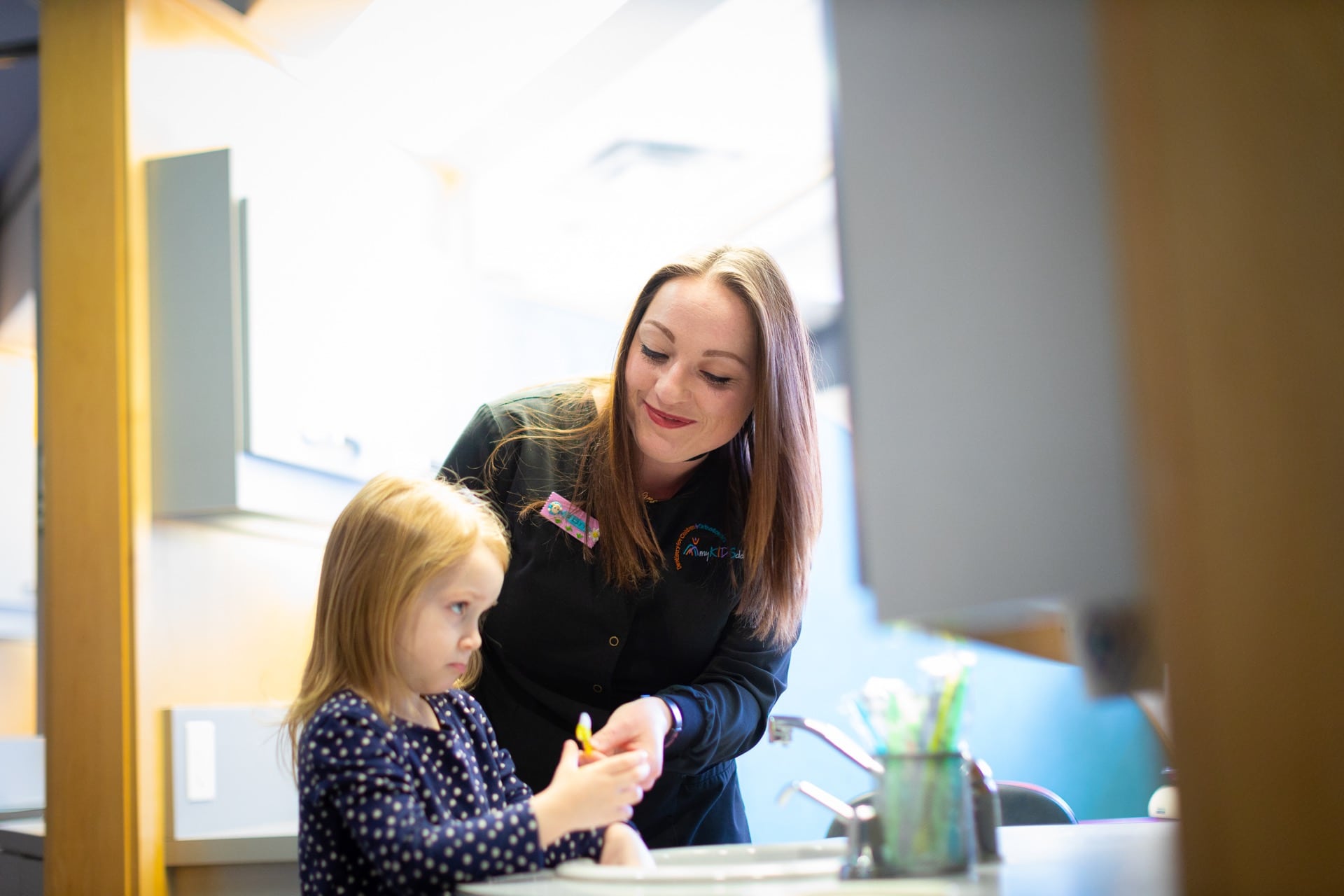
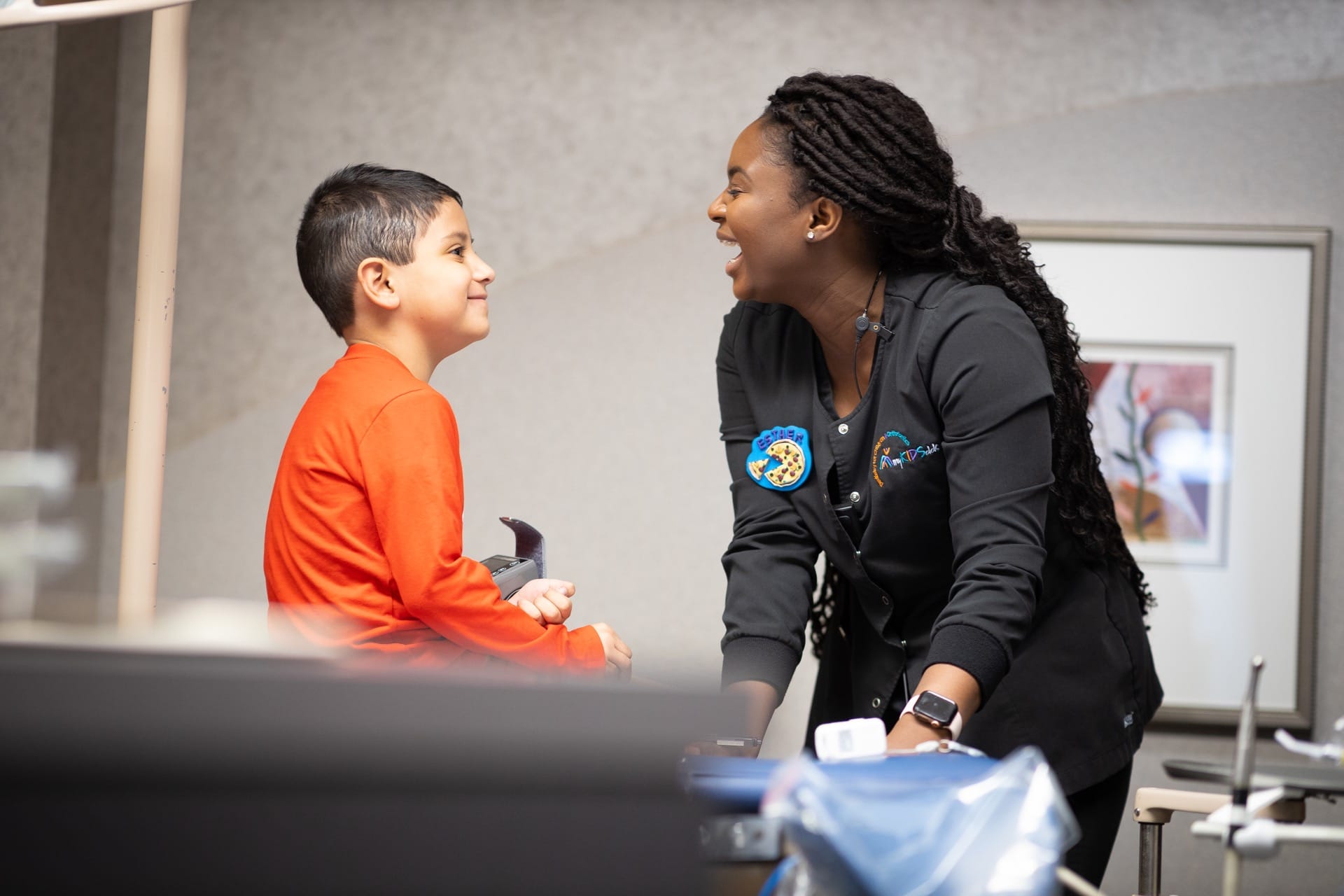
Cleaning and Exams:
Does your office use fluoride?
At myKidsDDS, we offer a fluoride varnish to all of our patients at their cleaning appointments. The American Academy of Pediatric Dentists supports the use of routine fluoride treatments to reduce tooth decay and reverse enamel demineralization. However, if you choose not to get this treatment, we support your decision 100%. We encourage all of our patients to feel comfortable and confident in the decisions they make for their children’s dental care.
How often does my child need X-rays?
We follow the guidelines of the American Dental Association to determine how frequently we take x-rays. We have several different kinds of x-rays that will be taken at various times to monitor growth and development or areas of concern. Your child will wear a full apron with a thyroid collar during their x-ray because your child’s safety is our top priority.
What is the Learning Lab?
We want to encourage learning new things throughout our patient’s treatment process. During your child’s regular cleaning, our highly trained staff may identify an opportunity to further their knowledge about a few different dental and health-related topics. An additional couple of minutes of fun, hands-on activities in our learning lab might motivate your child to make better dental and health decisions!
Cavity Prevention:
Baby teeth are not permanent, why do they need special care?
While baby teeth do not last as long as permanent teeth, baby teeth play an important part in their development. Your child’s first teeth do a lot of important things such as help your child speak, smile, chew, and hold space in the jaw for permanent teeth. Learn more about caring for baby teeth!
What causes a cavity?
There are several factors that come together in order to cause a cavity. Alone these factors may not cause decay, but if these factors overlap constantly, then your child will have an increased cavity risk.
Certain types of bacteria live in our mouths. When these bacteria come into contact with sugary foods left behind on our teeth after eating, acids are produced. These acids attack the enamel on the exterior of the teeth, eventually eating through the enamel and creating holes in the teeth, which we call cavities.
How do I prevent cavities?
Be sure that your child brushes at least twice a day with a fluoride toothpaste. Flossing daily will remove bacteria and food between the teeth that brushing can’t. Avoid sugary foods especially sticky sweets such as fruit roll ups, gummies, or raisins, and drinks such as juices and sodas. Limit snacking and maintain a healthy balanced diet. And finally, make regular appointments so that we can check the health of your child’s teeth and provide professional cleanings.
What are sealants?
Sealants fill the deep grooves and crevasses on the tops and sides of teeth that are difficult to brush and therefore are susceptible to decay. We recommend pediatric dental sealants as a safe, simple preventative way to help your child avoid cavities, especially for molars, which are hardest to reach.
Frenectomies:
What is a frenectomy?
A frenectomy is the removal of a small fold of tissue (frenum) either under the tongue or lip to free the attached structures involved. It can be performed when the frenum is considered too short and is prohibiting normal oral functions such as eating and speaking or if it is preventing the proper spacing of teeth. This also can be referred to as a tight frenum, a low frenum, tongue-tied, or lip-tied.
We have advanced laser technology that we use in order to increase patient comfort and decrease procedure time. We are able to do the treatment in-house at our office with our highly-trained staff and child-friendly environment.
On infants just days old that need a frenectomy in order to begin eating, we typically can perform it on the same day. Infants can feed immediately after the procedure. The overall health of your child is our top priority.
How do I know if my child needs a frenectomy?
For nursing mothers and infants some of the signs that baby may have a tongue-tie and/or lip-tie are difficulty latching or unproductive, sustained sucking. This can lead to cracked or bleeding nipples, pain in nipples from biting, and breast engorgement. It may also be a factor in poor weight gain, colic, or reflux in these babies.
What are the long-term effects of not having this problem corrected?
There are numerous long-term effects of leaving lip and/or tongue-ties uncorrected. As children develop language, a tongue-tie can often cause articulation problems, while older children may begin to see gum recession or poor food cleansing, and ultimately, cavities. A lip-tie can create an abnormal gap between the upper front teeth that is very difficult for even orthodontists to correct, due to the thickness and height of the tissue. A lip-tie can also make brushing very painful, as lifting the lip up to brush the gumline is restricted.
Home Care:
How should my child brush their teeth?
It is common to aid your child in brushing and flossing until the age of nine. We can help guide you during your child’s cleaning appointments to areas that need more attention. Brush their teeth at least twice a day (once in the morning and once at night) with a soft-bristled toothbrush for two minutes. Use fluoride toothpaste to remove food particles and plaque from the tooth surfaces. Lift their lips up to follow along the gum line with a toothbrush. If your child wants to be more independent in brushing, you can allow them to brush first then you can go back and brush after to adequately remove residual plaque and food particles.
Is there a specific toothpaste my child should be using?
At age two you may start using toothpaste with fluoride. For ages, two to three use an amount comparable to the size of a grain of rice. For ages, four to five use an amount similar to the size of a lentil. For ages six and up use a pea-sized amount. Smear the toothpaste across the toothbrush to minimize the swallowing of toothpaste. Encourage your child to spit out and rinse excess toothpaste. It is not necessary to wait until your child can spit to use fluoride toothpaste as long as you are using the correct amount of toothpaste.
How often should my child be flossing their teeth?
Clean between your child’s teeth by flossing at least once a day. Decay-causing bacteria can linger between teeth where toothbrush bristles can’t reach. Floss will help remove plaque and food particles from between the teeth and under the gum line. We encourage the use of any form of floss that will keep their teeth clean. You can use a small floss pick while they have only baby teeth. Once the permanent teeth begin to come in, you can graduate them to a flosser with a longer handle to reach further back (typically at age six, they begin to lose front teeth and gain extra teeth in the back).
Is there anything I can do about my child’s bad breath?
Brushing your child’s tongue can help remove odor-causing bacteria. Be sure to include it in their daily home oral care regimen to improve bad breath. If your child is a mouth breather or has increased their mouth-breathing through an illness or allergies, be aware that increased airflow through the mouth can decrease the washing effect of saliva and cause an odor. Keep your child hydrated and drinking water to help remove any remaining bacteria. Additionally, over the counter mouthwash may help however we advise that you avoid using any mouthwash containing alcohol if your child is a mouth breather as it will cause increased mouth dryness and reverse your efforts.
When is it safe for my child to use whitening products?
Teeth whitening is an optional cosmetic procedure in which parents can decide if/when they would like for their child to do it. We believe that a child’s smile can greatly affect their self-esteem and in some cases mean more to a child than just enhancing their appearance. When making this choice, it is important to keep the following in mind:
- Permanent teeth are naturally darker/more yellow than baby teeth. It is very typical to see a difference in teeth shades when comparing permanent teeth to baby teeth. As more permanent teeth come in, your child will gain a more uniform color.
- Stains on the outside of your child’s teeth can be removed during their cleaning appointments. Whitening products will not be able to remove these stains.
- If you choose to whiten your child’s teeth, we recommend trying over the counter whitening products first before using professional strength products. Some whitening products can cause an allergic reaction resulting in tissue sloughing. If your child experiences this, have them discontinue that product.
- Customized whitening trays can be made once all permanent teeth have erupted and after orthodontic treatment (if recommended). If your child has mixed dentition (both permanent and baby teeth) then we offer a whitening system with universal trays.
What foods or drinks should I avoid giving my child?
We encourage your child to eat a balanced diet and try to avoid extra-sugary and/or highly acidic treats. Nutritious foods such as raw vegetables, plain yogurt, cheese or fruit can help keep your smile healthy. When helping your child with their eating habits keep in mind that the frequency and consistency of their foods and drinks can affect their cavity risk. Avoid having your child eat throughout the day (grazing). Instead, allow for scheduled mealtimes and snack times. Also, avoid sticky foods that can linger on the tops of teeth such as gummy fruit snacks and raisins.
Remember that juices, even natural fruit juices, usually contain sugar that can increase cavity risk. And, even though diet soda drinks don’t have sugar in them, they still contain acids that can eat away at the enamel. Limit these drinks to mealtimes and dilute them if possible. Anything else throughout the day should be water.
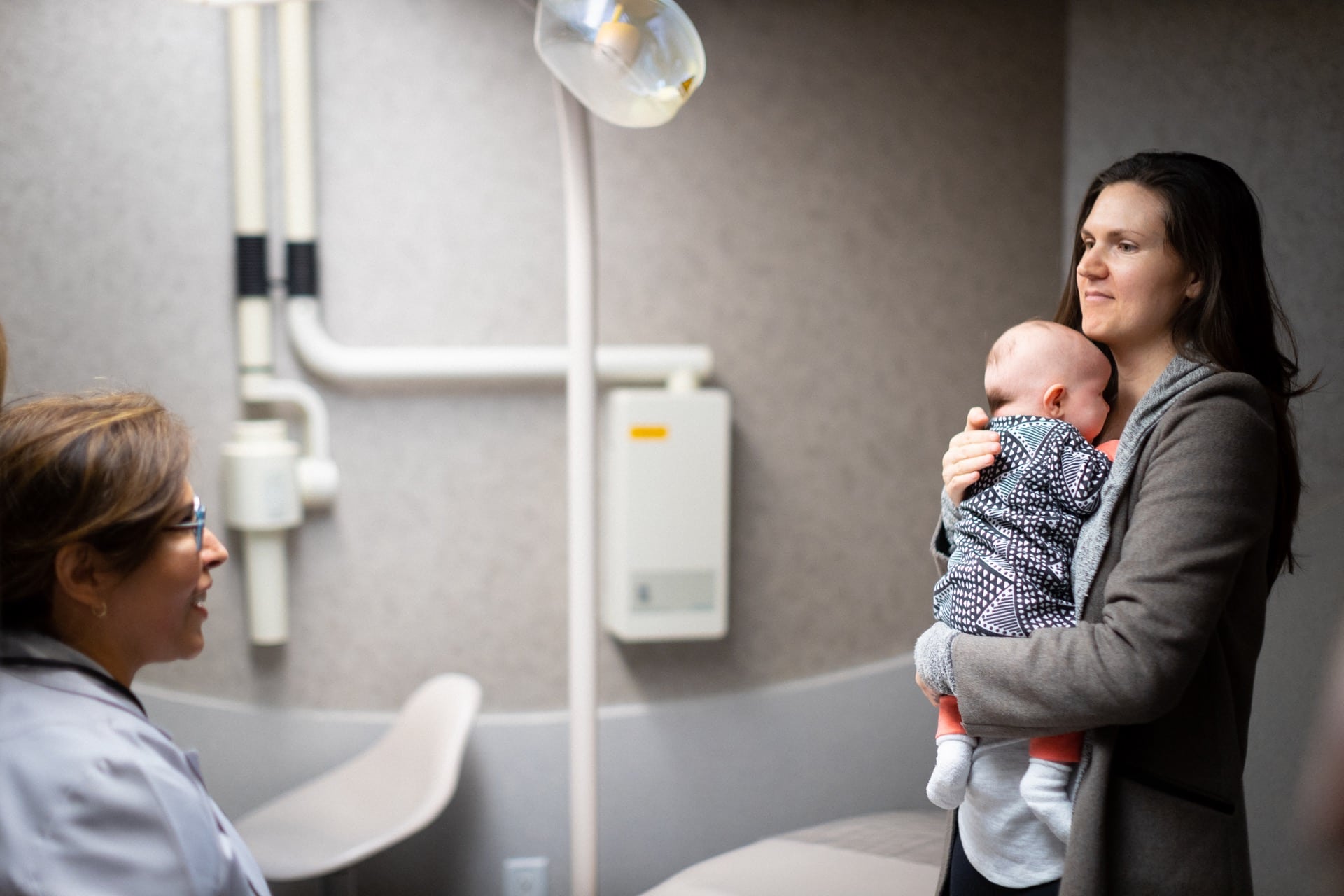

Dental Emergencies:
My child plays sports. How can I protect his teeth?
Even children’s sports involve contact, and we recommend mouthguards for children active in sports. If your little one plays baseball, soccer, or other sports, ask us about mouthguards made to protect their teeth, lips, cheeks, and gums.
What should I do if my child bites their lip or tongue?
If your child has a bitten lip or tongue severe enough to cause bleeding, clean the bite gently with water and use a cold compress (a cold, wet towel or washcloth pressed firmly against the area) to reduce or avoid swelling. If needed, contact us to help determine how serious the bite is. We are always available after hours for emergency calls.
The area of trauma may become ulcerated afterwards. It usually takes the mouth about two weeks to return to normal however, if the trauma continues (accidently biting it again), the healing process can be prolonged an additional two weeks from the most frequent trauma. You can use products such as Kanka or Children’s Orajel in order to help numb the areas for 8-10 minutes for temporary relief.
My child has something caught in their teeth, what should I do?
If your child has something caught between their teeth, use dental floss to gently remove it. Never use a metal, plastic, or sharp tool to remove a stuck object. Food or small particles may float underneath the gums and cause swelling and bleeding. Keep those areas clean by continuing to brush and floss daily. If you are unable to remove the item, contact us to help determine if your child needs to come in for us to remove it.
What should I do if my child has broken, chipped, or fractured a tooth?
If your child has chipped or broken a piece off of a tooth, rinse their mouth with warm water, then use a cold compress to reduce swelling. Try to locate and save the tooth fragment that broke off. Call us immediately.
You can help your child avoid dental emergencies and tooth trauma. Child-proof your house to avoid falls. Don’t let your child chew on ice, popcorn kernels, or other hard foods. Always use car seats for young children and require seat belts for older children.
What can I do to treat my child’s toothache?
If your child complains of a toothache, rinse his or her mouth with warm water and inspect the teeth to be sure there is nothing caught between them. If pain continues, use a cold compress to ease the pain. Do not apply heat or any kind of aspirin or topical pain reliever directly to the affected area, as this can cause damage to the gums. Children’s pain relievers may be taken orally. Schedule an appointment immediately in order for us to determine the cause of their discomfort.
In order to assist us in making a correct diagnosis, please take note of how long your child has been having a toothache. Try to have them recall if there was anything specific that they were eating, drinking, or doing when they first felt it. Record how often they feel discomfort and at what level (can range from it bothers them only a little to it keeps them from eating).
I think my child broke their jaw, what should I do?
If you know or suspect your child has sustained a broken jaw, use a cold compress to reduce swelling. Call us immediately on our main line 214-696-3082 and select the emergency option or head to the hospital if we are unable immediately assist you. In many cases a broken jaw is the result of a blow to the head. Severe blows to the head can be dangerous and even life-threatening.
What should I do if my child has a loose tooth?
Encourage your child to wiggle their loose tooth if it is expected to fall out soon. The more a tooth is played with, the more likely it will be able to fall out without any resistance. As a permanent tooth begins to grow in, it dissolves the baby tooth root. Wiggling the loose tooth will help this process in dissolving the roots. Once the baby tooth falls out, the permanent tooth will have an appropriate space to grow into.
If your child has a very loose tooth, it should be removed to avoid being swallowed or inhaled. You can use Kanka or Children’s Orajel to numb the area then using a twisting motion (like twisting off a bottle cap) remove the tooth.
If the baby tooth root does not properly dissolve, we may need to help extract the tooth in order to allow the permanent tooth to grow in. In these cases there will be a permanent tooth erupting around the baby tooth without any signs of the baby tooth coming out on its own. Sometimes it’s described as having two sets of teeth.







